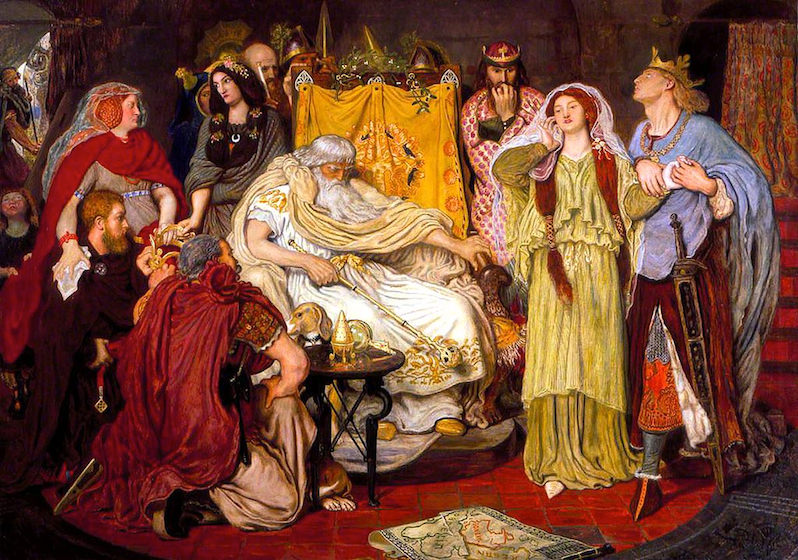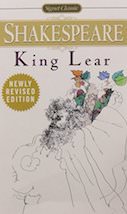‘Lear,’ Not ‘1984,’ Defines the Trump Era
The best literary precedent for what we're enduring now is not the absolute order of Big Brother but the irrational eruptions of King Lear. "Cordelia's Portion," an 1866 painting based on "King Lear" by Ford Madox Brown. (Wikimedia Commons)
"Cordelia's Portion," an 1866 painting based on "King Lear" by Ford Madox Brown. (Wikimedia Commons)
“Cordelia’s Portion,” an 1866 painting based on “King Lear” by Ford Madox Brown. (Wikimedia Commons)
We were wrong: The Trump era is not like George Orwell’s “1984.”
But how striking those echoes sounded at first. Kellyanne Conway, the president’s spirit animal, seemed to borrow phrases directly from Big Brother when she posited the existence of “alternative facts.” Press secretary Sean Spicer sounded like an official from the Ministry of Truth when he contradicted witnesses and photographs to claim that President Trump’s inauguration crowd was record-setting.
 King Lear
Purchase in the Truthdig Bazaar
King Lear
Purchase in the Truthdig Bazaar
Alarming as such dystopian comparisons were, they offered some deep satisfaction in the early days of our dark ages. Playing the Orwell card was not just a handy insult with a dash of literary sophistication; it also exercised a salutary effect on right-thinking people. To connect the day’s latest outrage to a classic novel suggested that we’d seen Trump’s behavior before, that literature had anticipated his linguistic abuses, that his appeal could be understood. Having on the breastplate of foreknowledge, we could withstand whatever further assaults might be coming.
By now it should be clear that the Trump administration is nothing like the ruling power of Orwell’s Oceania or — another common claim — like Margaret Atwood’s Gilead in “The Handmaid’s Tale.” The repressive governments of those imagined hellscapes are marked, primarily, not by their vast deception but by their absolute order. Flawless message control and meticulous image manipulation are the foundations of their sovereignty. Nothing could be further from the continuous upheaval that Donald Trump wreaks.
For literary precedent, we should skip over the dystopian novels of the 20th century, which were predicated on terrifyingly invasive management. The most prominent characteristic of our era is not the monolithic power of one party, but the erratic personality of one man. Every morning, all sides of the political establishment — his family and friends, along with “the haters and losers” — must contend with Trump’s zigzagging proclamations, his grandiose promises, his spasmodic attachments.
Consequently, the best literary precedent for what we’re enduring now is not the static image of Big Brother but the turbulent eruptions of King Lear. In Shakespeare’s immortal tragedy, composed around 1605, we see a kingdom entirely in thrall to the fitful mentality of its leader with his “unconstant starts.” As one of Lear’s daughters says, “The best and soundest of his time hath been but rash.” Or, as Politico observed 400 years later about our president: “Unpredictability … is not a quirk but a hallmark.”
Once you make the comparison between Lear and Trump, the similarities begin to line up like attendants at court. Most striking, the old king of Britain and the new president of the United States are rulers obsessed with personal devotion. Trump is, as he once noted in his typically Shakespearean way, “like, this great loyalty freak.”
Trump’s language may not pass muster in ninth-grade English, but that’s a pretty fair description of King Lear. In fact, the great crisis of Shakespeare’s tragedy hinges on the fact that Lear is, like, this great loyalty freak, too. How eerily familiar that opening scene must feel to the Cabinet members and advisers currying favor at 1600 Pennsylvania Ave.:
“Which of you,” Lear demands, “shall we say doth love us most?”
Goneril and Regan dutifully deliver their unctuous praise, but principled Cordelia — played for us with touching poignancy by FBI Director James B. Comey — refuses to take the loyalty pledge and is summarily disinherited. (Lear doesn’t even wait for the Earl of Kent to compose a memo justifying the move.)
Now, like Lear’s subjects, we find ourselves experiencing the chaos that reigns “when majesty falls to folly.” As the Russian inquiry melds with the Michael Flynn scandal and the Comey investigation, the ludicrous denials and confusing qualifications keep spewing from the White House. Each day’s revelations are more disturbing than the last. We can take bitter comfort in Edgar’s gallows humor: “The worst is not, so long as we can say, ‘This is the worst.’ ”
How many of the president’s supporters have begged him — as Lear’s supporters implored him — “Check this hideous rashness”? But to no avail. Again and again, often at the most ill-timed moments, the president rages into the Twitterstorm on the barren plain of the web.
“Fake news!” “When does it end?” “This is a disgrace!”
“Blow, winds, and crack your cheeks! Rage! Blow!”
And despite boundless advantages and allowances, Trump echoes Lear’s whiny complaint: “I am a man more sinned against than sinning.”
Who doesn’t feel a prick of pity for this grandiose character wandering alone in his bathrobe in the dark, early-morning hours?
Too soon, you say.
Well, in the words of Cordelia, “Time shall unfold what plighted cunning hides.”
It’s worth noting that after the Restoration, audiences couldn’t stomach the tragedy of King Lear. For almost 200 years, theaters staged a happier “Lear,” a script substantially altered by Nahum Tate, who became England’s poet laureate in 1692. According to Tate’s version, Lear survives his foolish decisions and retakes his throne. Cordelia marries Edgar. Peace is restored. #MakeLearGreatAgain.
Curiously, there was no Fool in Tate’s “improved” version, but we need one in ours. Who will speak sharp sense to the president in a way he can hear? Who will quell his Twitter raging? Surely not Vice President Pence; he prefers the part of Goneril, proficient in flattery, “that glib and oily art.” And Stephen K. Bannon is committed to playing Lady Macbeth in a competing production in the White House basement.
Meanwhile, we don’t know how our version of “King Lear” will end. After all, we’re still in Act I. We don’t even know how many acts this play has, or whether there will be an intermission. And these seats already feel incredibly uncomfortable.
As we settle in, consider that Shakespeare was not above switching moods along the way. “Romeo and Juliet” starts off as a comedy but ends in tragedy. “Measure for Measure” gets very dark before its joyful conclusion.
History is even less predictable than the Bard. And so, with Kent, the King’s loyal subject, we may offer up a little prayer for America: “Fortune, good-night: smile once more; turn thy wheel!”
Ron Charles is the editor of The Washington Post’s Book World.
© 2017, The Washington Post
Your support matters…Independent journalism is under threat and overshadowed by heavily funded mainstream media.
You can help level the playing field. Become a member.
Your tax-deductible contribution keeps us digging beneath the headlines to give you thought-provoking, investigative reporting and analysis that unearths what's really happening- without compromise.
Give today to support our courageous, independent journalists.






You need to be a supporter to comment.
There are currently no responses to this article.
Be the first to respond.